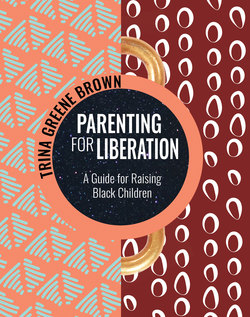Читать книгу Parenting for Liberation - Trina Greene Brown - Страница 12
ОглавлениеSTORY 4
Finding a Village: How to Build a Black Community
Malesha Taylor, classically trained opera singer; founder of museSalon Collaborative
As I was building up Parenting for Liberation, I was searching for conferences and learning opportunities to nurture this idea I had given birth to. In fall 2017 I attended the Brioxy Summit in Los Angeles, where attendees were invited to develop our skills as leaders, strategize around the work we were building, and deepen our toolkit in self-care. It was there that I met so many amazing leaders, artists, and entrepreneurs of color—one of whom was Malesha Taylor, a classically trained opera singer and mother of three, residing in San Diego, a suburban community in Southern California. At the summit, we swapped business cards to discuss collaborating and supporting one another as mothers of color parenting in suburbia. During our discussion, Malesha reflected on the trauma of her own childhood, growing up in California’s suburbs as the only Black kid. She shares tips on how to manifest and build community in spaces that feel isolating, through the use of arts and culture. With a commitment to “never be the only,” Malesha advocates for centering Black voices and other marginalized communities in the arts, through her organization, museSalon Collaborative and through her work as a vanguard Black opera singer. Here’s an excerpt of our conversation:
Growing Up “Different”
“I grew up in Los Angeles County, in the suburbs. I didn’t really have an idea of a Black community here, other than the Black church. I didn’t really have a sense of culture or Black Liberation.
“When I was growing up, I was almost always the only Black person in every environment (except when I was with family). However, my family didn’t go out of their way to make sure I had Black friends, so I felt a lot of discomfort, including psychological discomfort. When I reflect on it, I always knew that I was different.
“It didn’t help that I had to explain myself everywhere I went. From questions about my hair (‘Oh Malesha, you have braids and your hair is long this week, but last week you had a ponytail. What’s up with that?’) to dating (when it was time for a school dance, I had to hope some white guy was going to invite me). As a young girl, I often felt kind of different and undesirable. Now, as a parent, I think it’s important that my kids have some relief and not have to experience that all the time. I am creating spaces for them where they are bonding and building relationships with other Black kids and other Black leaders, elders, aunties, and uncles. We are building and filling that village so that they always have a village to identify with and to fall back on.”
Finding Home in a Different World
“As a young adult, when I lived in Brooklyn, I got to a place where I could wear my natural hair and explore all of its different shapes. It’s a fuller diaspora of Black people there—there’s African, Caribbean, the migration of Black people from the South. I really got to see the beauty of our people there—from owning our own businesses to talking to each other and being happy to see each other in the neighborhood. While leasing, all of my landlords were Black so I got to see Black people owning property and I paid rent to people that looked like me. While walking down the street, I saw people who knew my name—this was just totally different from how I grew up.
“Now I live in San Diego, California. Moving here from Brooklyn was a really life-changing experience which helped in further developing my identity as a Black woman. In San Diego, there’s 8 percent Black people, which is small but substantial, because it means that the Black people here know each other. Since we’re such a small community, we are able to build deep bonds and connections. I’ve recently discovered other families that share similar values and I make time to hang out with them. I’ve identified individuals like these and slowly created a village. There are at least ten folks that I celebrate Kwanzaa with every year who I can call for babysitting, host a book club with, and just create a network.”
Another White World
“I sing at the opera, which is a similar phenomenon to my childhood because it’s a very white space for me as well, although I am working on decolonizing the arts. I’ve been in the theater opera world since high school, and back then I knew I was the only Black kid and I knew that it was a predominantly white space, but it wasn’t deeply affecting me because my whole day was that way. I always tried to blend in; I wasn’t trying to stick out, so my Blackness was very subdued. However, now that I’ve lived in Brooklyn and experienced a real Black village, my Blackness is a part of what keeps me stable and whole. Now, I’m working with Art for a Changing America and some other campaigns on decolonizing the arts and pushing for racial justice and representation in the arts. I formed my collaborative, museSalon, to be a resource to other artists like myself to be able to financially sustain themselves.”
